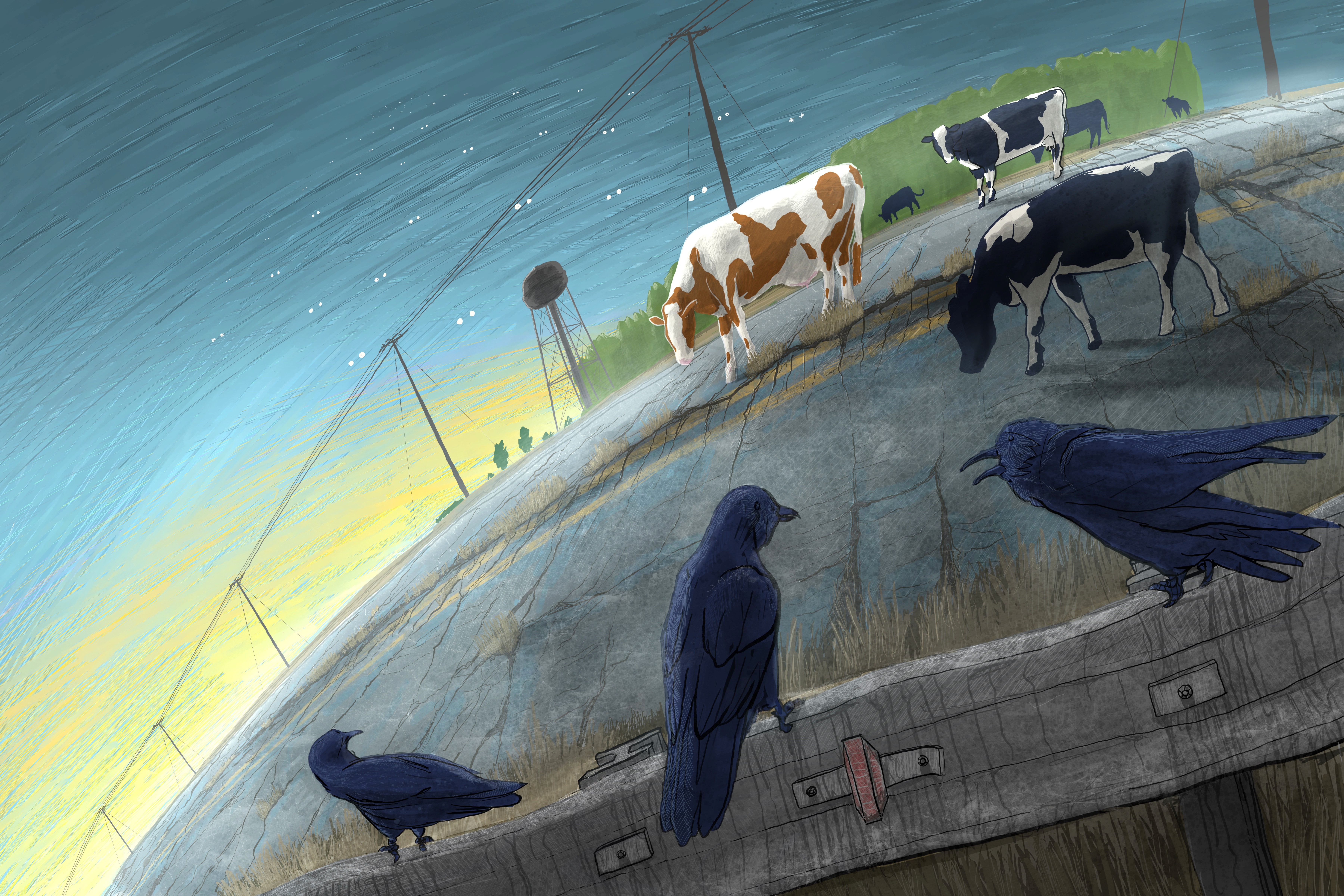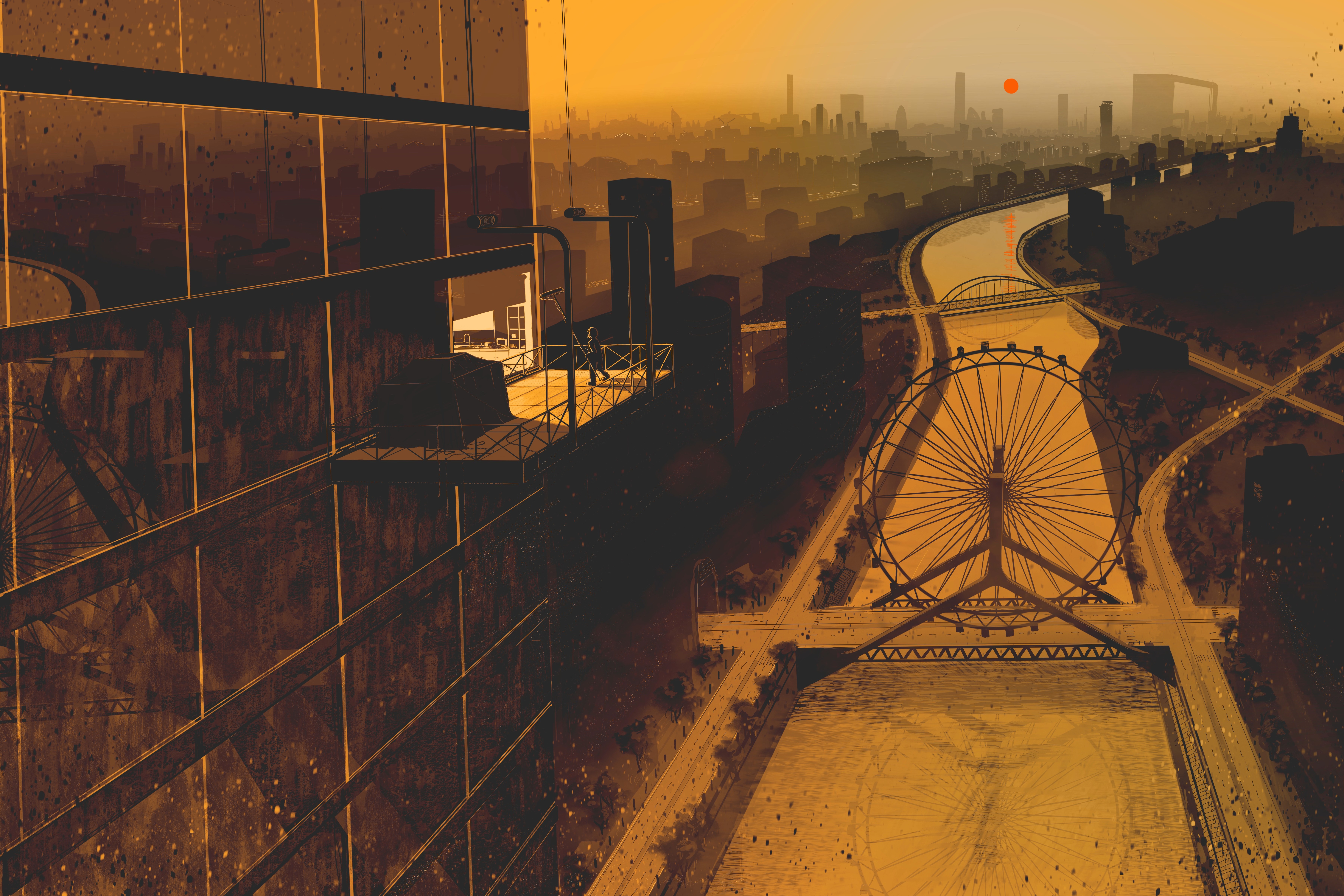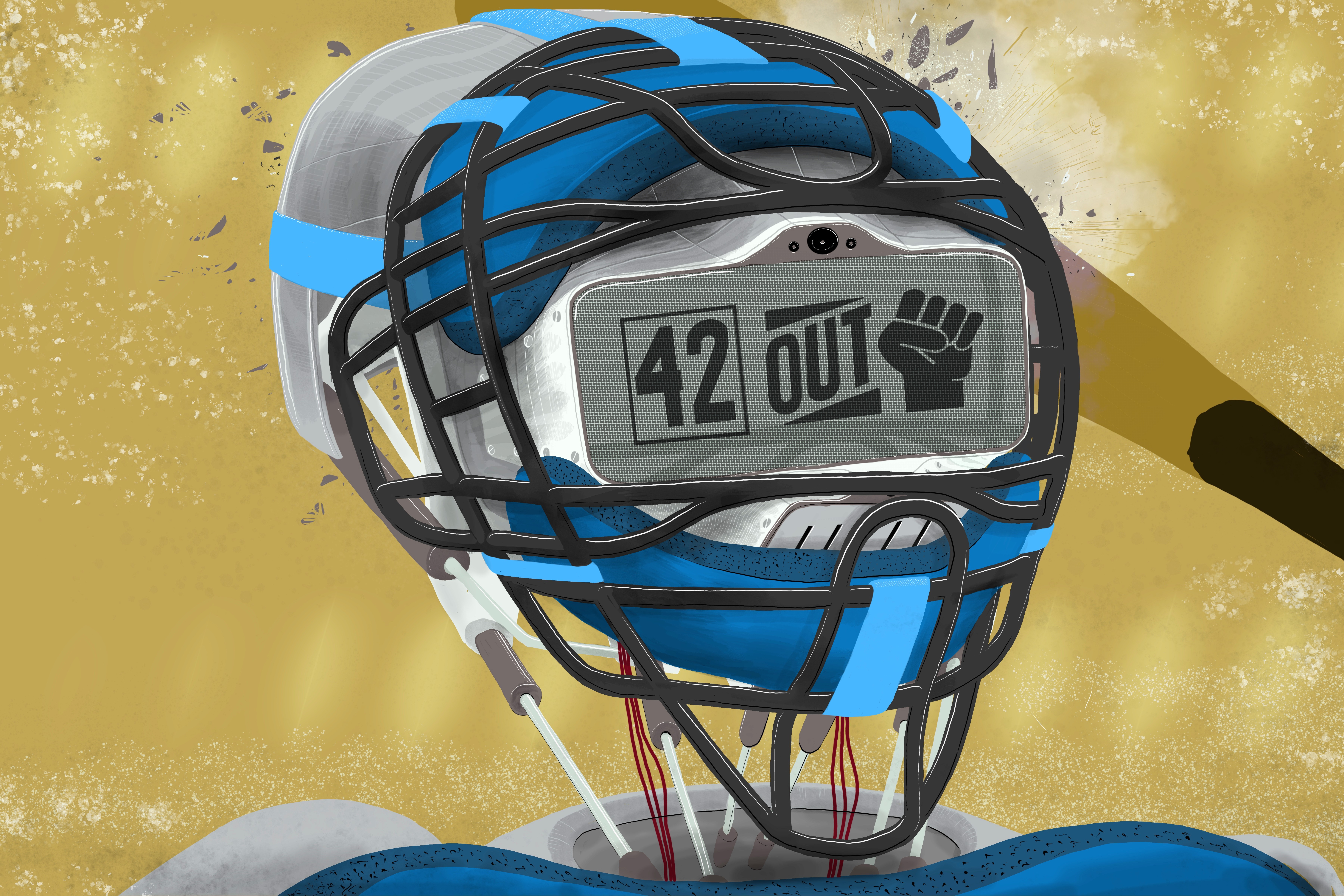The Last Harvest
by Marisca Pichette
Marisca Pichette takes us down a fabled road where all the animals that people once looked after have been left to put the pieces back together.
October began with a red sunrise. Blades of grass stuck out at odd angles, broken by the frost. Forgotten crops, crouched amid beaten mounds, wound in rows across the hill overlooking where the ships left Earth for the last time.
Watched from above, a sluggish toad hopped from rut to muddied rut, searching for a hole to shelter from the oncoming winter. Between squash and cucumbers rotting in half-frozen ground, its life was little changed after humanity’s departure. Judging the toad neither threat nor meal, Cowbirds picked their way through lines of bent cornstalk stumps grown over with weeds. In their waterdrop calls, they recalled the truth: There is no beginning. No end.
Few heard them, and fewer understood the story they knew.
Around the dying harvest, trees stood in fiery defeat, their last leaves senescing and abscising on the wind. Not far from their Cowbird cousins, Juncos took their places, preening as they always had. It was a familiar, annual dance—little changed, they thought. Their trilling carried on a breeze that whispered of snow.
At least. This they left. For us.
Marching away from the fringes of the fields, Crows picked through damp mulch. Trees climbed the ponderous incline of one hill, then another. A range of mountains ringed the autumn valley, casting the river in a speckled coat of shadow and light as the sun fell lower in the sky. Glacier-carved, weather-worn. The Crows muttered between pecks: This winter will be colder. Colder, colder. Colder than the rest.
It would be misleading to say that there was silence. There was never silence—even before they came.
Grosbeaks said their flocks were first to meet the ships, but Blackbirds also claim that honor. Chickadees remembered metal wings and whining, like an animal in distress. Titmice were of the opinion that the ships looked more like beetles than Birds. All of them, though, could agree on one point: people never belonged. This was not their home–though they stayed for a long time.
Now, after they left, sounds that had existed underneath their din rose to the surface. Mourning Doves strutted along barn roofs, skirting holes. Almost lost in their cooing: Here, we’ll nest again, again.
Below, a timid herd of cows plodded through the frigid mud, lowing with misty breath. The beaten-down fence that once penned them in had fallen weeks ago. No one came to repair it. Lying in October mud it had already begun to rot, rain having soaked the boards dark. Now the herd wandered where it would, leaving cloven marks in the early snow.
Sparrows hopped out of their way, earnestly explaining in chirps the way of things (though the cows didn’t understand them): They took themselves. And left the rest.
At the head of the herd walked an old, brown-spotted heifer, udder sagging between her legs. Like all flightless animals,she failed to understand the words of the Sparrows underfoot, or the Crows overhead. Still, she sensed they spoke of her. Marching to the rhythm of their sharp trills and beak-knocking subsong, she knew that she and her cattle were not the only domestic creatures forced into the wild when the ships left. Though the languages of cows and Crows diverged long ago, the landscape filled in the gaps.
They came on wings! The Sparrows argued that was why Birds understood, why they remembered the story best.
The Crows disagreed. Not flight, one cawed. Migration. It was the leaving that made the people most like Birds: their restless, homeless motion. It might have taken many generations, but their season shifted. The wind changed, and they left.
And we remain, the flock echoed.
A family of Ducks now lived in the empty town hall. Chickens roosted in garages and open cars. From high perches and feather-lined nests, they observed the plight of the wingless. Dogs wandered the streets, crying. Cats vanished into shadows, silent. Some species were more lost than others. How could they fend for themselves? Where would they sleep? Before the ships left, water and electricity had ceased flowing through houses. Lights switched off, never to reignite. Engines muttered before falling into silence.
The people wrapped everything up, closed doors and windows before they went. It was almost as if they followed a script, some distant memory drawing them away.
Again, again. Mourning Doves cooed in the naked trees. Away again.
The heifer led her herd under this music, along the cracked, salt-stained road. There were just six of them, weary and aching to be milked. Cats came to them at night, relieving some of the pain. Just one calf would help, but the herd had yet to find a bull.
On, on! Chattered the Sparrows from above. The only way is on. Hearing, but not understanding, the cows wound down the one-lane road, past rusted tractors and overturned flowerpots. A Chickadee picked through the soil, searching for seeds. At their approach, it hopped to the side, chk-chking.
South, it advised, ruffling its feathers. But the old heifer had no need of this direction; she could smell manure in the distance. Perhaps on another farm, there would be a bull. Perhaps also a barn with enough feed to last the winter. She paused across from a strip mall, its windows clouded and dark. Her herd faltered behind her, nosing the air. The scent of people was strong, but old, here. Months had reduced a once overpowering aroma into a series of echoes.
The Crows crowded along the mall roof, observing the herd with black eyes. Overhead, the dappled sky was grey on grey; only the west showed any hint of color, blazing with orange light as the red sun set behind the hills. Hawks sailed beneath the clouds, remarking that the sky was theirs once more. The river, swollen by autumn rains, churned down from farmland to town, rushing beneath an empty bridge, an abandoned fishing pole wedged lopsided at the peak of its arch. Cars sat in front of houses, their windows hibernating under layers of frost.
The heifer led her herd past, chasing the distant shapes of tobacco barns. Stray leaves leapt up with the northern wind and dove into the swirling waters of the river, taking a swifter route away from the town. They spun past dark windows and the shadowy shapes of moored boats, around bends fraught with storm debris. Unacknowledged, they crossed invisible state lines and carried on into the night, following the riverbank, where a raccoon pulled apart a bread wrapper, seeking forgotten crumbs.
On the opposite shore, a Cardinal turned to his mate. They looked like eyes, eyes. Eyes in the dark. She plucked a flea from her plumage, swallowing it in pieces. Cocking her head to the sky, she remembered the lights. So silent, she chirped. Like they hoped. We wouldn’t notice them go.
Her mate watched a leaf float past, heading downstream. He remembered the tales, as all Birds did. Like ghosts, he replied.
The last rays of sun slipped between the trees, hitting the stream and fracturing into dazzling reflections. The Cardinals took off, the valley spread out below them in stripes of black and gold. Fallow farms, unplowed streets, smokeless homes and icy lawns appeared as in shutter film.
No silence, she called.
No stillness, he cried.
Clouds still charged past overhead. Trees still shed their ignited leaves, preparing for winter’s long siege. The world endured. Animals moved through a landscape shaped by hands they would never see again. Between faltering buildings, Birds called to one another.
Have you seen any? Surely some are left. There were so many, so many.
Some, dead in houses. Forgotten.
None alive? To fill feeders?
None.
So it’s happened again. Again, again.
-
Across the river, the heifer led her herd on. The cattle trotted past a drugstore, hardly glancing in its direction. If they had looked closer (as the Crows did), they’d have seen, in a hole just beneath the front door, a mouse resting on its haunches, watching the parade.
No Birds lived here. The young mouse shared the drugstore instead with beetles, ants, garter snakes seeking shelter from the cold. But it was not as warm as it had once been. The vents sat silent and blew no heat. Within the ductwork, the mouse was building a nest of threads chewed from rags and paper torn from pads. It feared the garter snakes were just the beginning, and soon milk snakes would find their way in, hungry for mice. Traps had been easier to survive.
When the herd had passed, and the Crows with it, the mouse turned and vanished back into its unwelcoming home. It skittered past shelves packed with food, holes nibbled in packages, mold creeping from one item to the next. It turned the aisle corners and burrowed back into a bag of cornmeal, rearranging lint and hair, paper and fluff.
As the sun dipped lower in the sky, the cows passed a church. A handful of Crows detached from the flock and settled on the sign. Plastic letters sagged beneath their claws. Only one word remained of the message put in place months before: PRAY. One Crow squawked to the chilly air: Who taught them to fly?
The old heifer grunted and the Crows flapped away, continuing to jabber in words that held no meaning for her. Cows never learned the story. They didn’t exist before people—not in their current form. Much was lost to breeding. Much was lost to time.
The flock regrouped along the church roof, watching. With only her nose to guide her, the heifer led her herd to the edge of town. She paused beside a car, snuffling around its rolled down windows. She pulled out a bag of chips and dropped it between her hooves. Plastic crackled.
A few bites and the package split, scattering chips onto the road. Her herd crowded around, crunching this little food as the sun set fully, sky darkening. Several Crows winged down to join the meagre feast, snatching flakes of potato and dodging hooves. Tongue thick with salt, the heifer called to her herd, and they wandered on. The Crows finished what crumbs remained.
Leaves fell around them, bringing with them the curtain of night. No streetlights gleamed to life. No candles flickered in distant windows. No signs flashed incessantly against the darkness.
From the crook of a sycamore, an Owl hooted to the night: Before, before. It was like this before.
-
The Birds remembered.
Great Blue Herons told it like this: Nights were black. Only life moved. Only life spoke.
Mourning Doves knew the story also, passed down from flock to flock. It was woven into their song—a memory of what was lost, what moved into the space reserved for life. They remembered each time they took flight, wings whistling for that past.
The lights came, came. Came from above.
Turkey Vultures, hunched on leaning telephone poles, retold history in their own way: They circled in pairs. Looking for places to build. Places to light. Places to write.
Redwing Blackbirds knew this part of the story best: First, they built with stone. They lived with us. We, with them. They made noise when they came, came, But their lights dimmed, in time, in time. They lived like us.
Nuthatches spread their small wings wide and called to the sky.
But more came, came. More came.
-
Cats roamed through the night, following the trail of the cows. Bats hunted without distraction, and many Birds slept. On the side of a once-highway, the heifer found an open mechanic shop. She ushered her shivering herd inside as clouds covered the moon. Between toolboxes and tires, they bedded down.
In the rafters above, Chimney Swifts peered down at their guests. More heat. They clicked their beaks and closed their eyes before darkness swallowed everything. Each night had been longer than the one before, and it took weeks for even the Birds to adapt to the patterns they had evolved to follow. In time, though, they knew–the landscape would right itself, though it may take years. Cows and cats would learn to live anew.
Gradually, the sky lightened. The heifer stirred as morning songs trickled from overhead. Outside the mechanic shop, a Titmouse unfurled his crest, remembering the tale he’d learned in the egg.
Years passed, passed. They spread. They grew.
But where? They came from where? a Wren asked her mother.
They flew here, she replied, ruffling her feathers. Flew, flew like us. From another home.
The cows filed out into the gray morning light. Sniffing chilly air, the heifer led her sisters south. Eight Turkeys strolled across the field to their left. Their words were hushed, wary of coyotes lurking on the wood’s edge. Behind them—another lost home. Now we see it, see it. We see it here.
They gathered in a pumpkin patch, pecking seeds from the mush as the cows marched on. One to another, the Turkeys spoke.
People always leave.
-
In the absence of people, the Birds had grown interested in their remnants. Crows were most curious, but theirs wasn’t the only flock that winged from tree to tree, marking the progress of the six cows. Hoofbeats clattered on pavement, bovine shadows stretching long in the afternoon.
A trio of Blue Jays screamed from the upper branches of a birch tree: Lights in pairs! In pairs! Like eyes, unblinking.
The old heifer huffed. Shadows crossed her path, and she looked up to see late Geese flying in formation, chasing a lopsided sunset. They left us with night, they squawked. Night, night. Night as it should be.
Hooves clumped. Feathers rustled. Sparrows flew ahead, scouting the landscape and calling to their cousins to urge the cows one way or another. It was difficult, taking the place once occupied by people. The cows were less receptive to Crows and Blackbirds.
At the end of the shortening day, aided by her nose and the flocks above, the heifer found a barn at last. Its walls were thin, but the corners were filled with feed and hay. Her herd settled in, cats perched on haybales against the drafty walls. In the gathering gloom, they slunk closer, sharing what warmth remained. Birds covered the roof, singing softly.
When night came, it was to a not-quite empty planet, given a chance at a second life. Houses filled with dust from the inside out. Around, animals milled, tasting the sharpness of colder air.
Filling trees and rafters—Birds called to each other in a language of their own.
See them?
Stars filled the sky. Not all were still. Farther than wings could fly, the ships sped on, seeking a third home.
They flock, a pair of Barn Owls whispered to each other while the cows slept. To memory. To hope.
In silence, it started to snow. Ghostly white covered houses, cars, crops. The landscape changed–as it always did. Nestled under the eaves, the Barn Owls watched, and wondered what the future would bring.
Again, again.



